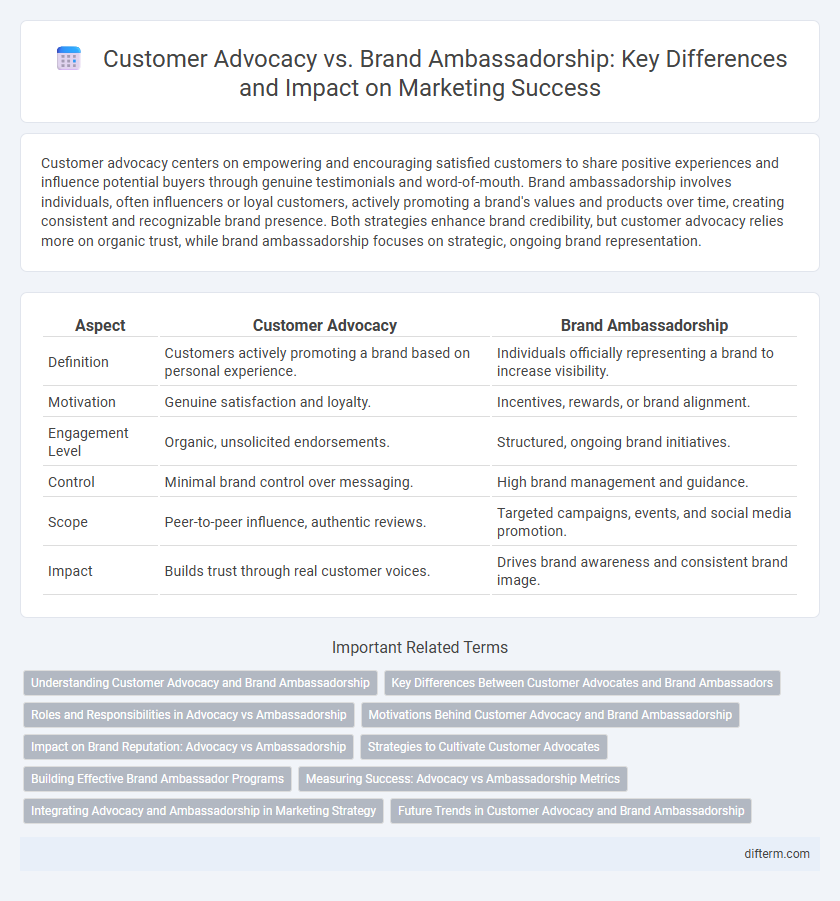Customer advocacy centers on empowering and encouraging satisfied customers to share positive experiences and influence potential buyers through genuine testimonials and word-of-mouth. Brand ambassadorship involves individuals, often influencers or loyal customers, actively promoting a brand's values and products over time, creating consistent and recognizable brand presence. Both strategies enhance brand credibility, but customer advocacy relies more on organic trust, while brand ambassadorship focuses on strategic, ongoing brand representation.
Table of Comparison
| Aspect | Customer Advocacy | Brand Ambassadorship |
|---|---|---|
| Definition | Customers actively promoting a brand based on personal experience. | Individuals officially representing a brand to increase visibility. |
| Motivation | Genuine satisfaction and loyalty. | Incentives, rewards, or brand alignment. |
| Engagement Level | Organic, unsolicited endorsements. | Structured, ongoing brand initiatives. |
| Control | Minimal brand control over messaging. | High brand management and guidance. |
| Scope | Peer-to-peer influence, authentic reviews. | Targeted campaigns, events, and social media promotion. |
| Impact | Builds trust through real customer voices. | Drives brand awareness and consistent brand image. |
Understanding Customer Advocacy and Brand Ambassadorship
Customer advocacy involves customers actively promoting a company based on positive personal experiences and trust, often through reviews and referrals, while brand ambassadorship is a formal relationship where individuals represent and endorse the brand on various platforms. Understanding these distinctions helps businesses leverage authentic customer voices while fostering long-term brand loyalty through strategic ambassador programs. Effective marketing strategies integrate both to amplify credibility, increase engagement, and drive sustainable growth.
Key Differences Between Customer Advocates and Brand Ambassadors
Customer advocates actively promote a brand based on their personal experience and satisfaction, often through word-of-mouth or organic online reviews, emphasizing genuine trust and credibility. Brand ambassadors typically have a formal relationship with the company, engaging in marketing campaigns, social media content creation, and events to represent and elevate the brand's image. The key difference lies in advocacy being driven by authentic customer loyalty, while ambassadorship is usually a strategic partnership designed to increase brand visibility and influence.
Roles and Responsibilities in Advocacy vs Ambassadorship
Customer advocacy involves promoting a brand based on genuine customer experiences and feedback, where advocates share honest reviews and act as trusted sources within their networks. Brand ambassadorship requires a formal relationship with the company, with ambassadors actively representing and endorsing the brand through campaigns, events, and social media presence. Advocates focus on authentic, organic promotion rooted in personal satisfaction, while ambassadors have explicit roles in marketing initiatives, aligning closely with brand messaging and strategy.
Motivations Behind Customer Advocacy and Brand Ambassadorship
Customer advocacy is driven primarily by genuine satisfaction and trust in a brand's products or services, motivating customers to share positive experiences and influence peers authentically. Brand ambassadorship often involves deeper emotional connection and alignment with a brand's values, encouraging ambassadors to actively promote and defend the brand in various channels. Both motivations fuel organic marketing, but customer advocacy centers on personal endorsement, while brand ambassadorship typically includes strategic representation and engagement.
Impact on Brand Reputation: Advocacy vs Ambassadorship
Customer advocacy builds trust through genuine testimonials and organic word-of-mouth, directly enhancing brand reputation by showcasing authentic user experiences. Brand ambassadorship leverages influential personalities or loyal customers to amplify brand messaging, creating a broader but sometimes less personal impact on public perception. Both strategies significantly influence brand reputation, with advocacy fostering deep credibility and ambassadorship driving widespread awareness and engagement.
Strategies to Cultivate Customer Advocates
Develop targeted engagement strategies to transform satisfied customers into passionate advocates by providing personalized experiences and proactive support. Leverage social proof through testimonials, reviews, and case studies to build credibility and inspire trust among potential clients. Utilize loyalty programs and exclusive content to deepen customer relationships and encourage organic promotion of your brand.
Building Effective Brand Ambassador Programs
Building effective brand ambassador programs involves selecting passionate customers who genuinely align with the brand's values and products, driving authentic advocacy. Leveraging personalized engagement strategies and incentives encourages ongoing participation and amplifies brand awareness through trusted voices. Tracking key performance indicators such as engagement rates, referral conversions, and social media reach ensures continuous optimization and program success.
Measuring Success: Advocacy vs Ambassadorship Metrics
Customer advocacy metrics focus on Net Promoter Score (NPS), customer satisfaction (CSAT), and referral rates to gauge genuine customer loyalty and organic promotion. Brand ambassadorship metrics emphasize social media engagement, content shares, and influencer reach to measure the impact of actively promoted brand endorsements. Combining both sets of data provides a holistic view of brand health, balancing authentic customer-driven growth with strategic promotional efforts.
Integrating Advocacy and Ambassadorship in Marketing Strategy
Integrating customer advocacy and brand ambassadorship in marketing strategy enhances authentic engagement and drives organic growth by leveraging the genuine voices of satisfied customers and passionate promoters. Combining advocacy programs that encourage customer testimonials with ambassadorship initiatives recruiting influential brand champions fosters trust and amplifies reach across social channels. This holistic approach results in increased brand loyalty, higher conversion rates, and a sustainable competitive advantage in customer-driven marketing efforts.
Future Trends in Customer Advocacy and Brand Ambassadorship
Customer advocacy and brand ambassadorship are evolving with increased integration of AI-driven personalization and influencer partnerships to enhance authenticity and engagement. Future trends indicate a shift towards leveraging advanced analytics and blockchain technology to ensure transparency and trust in customer interactions. Brands investing in immersive experiences and community-building platforms will drive deeper emotional connections and sustainable loyalty.
Customer Advocacy vs Brand Ambassadorship Infographic

 difterm.com
difterm.com